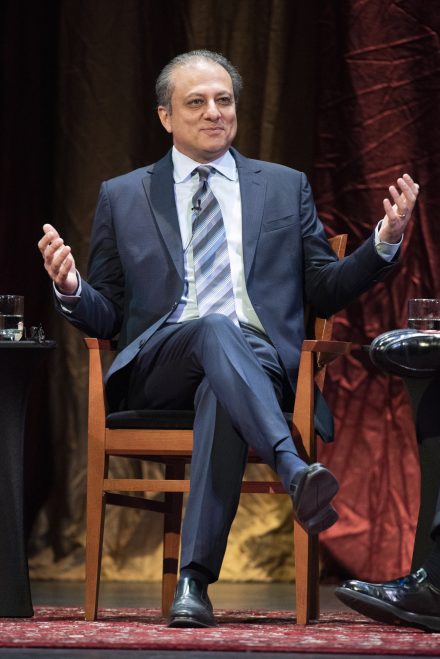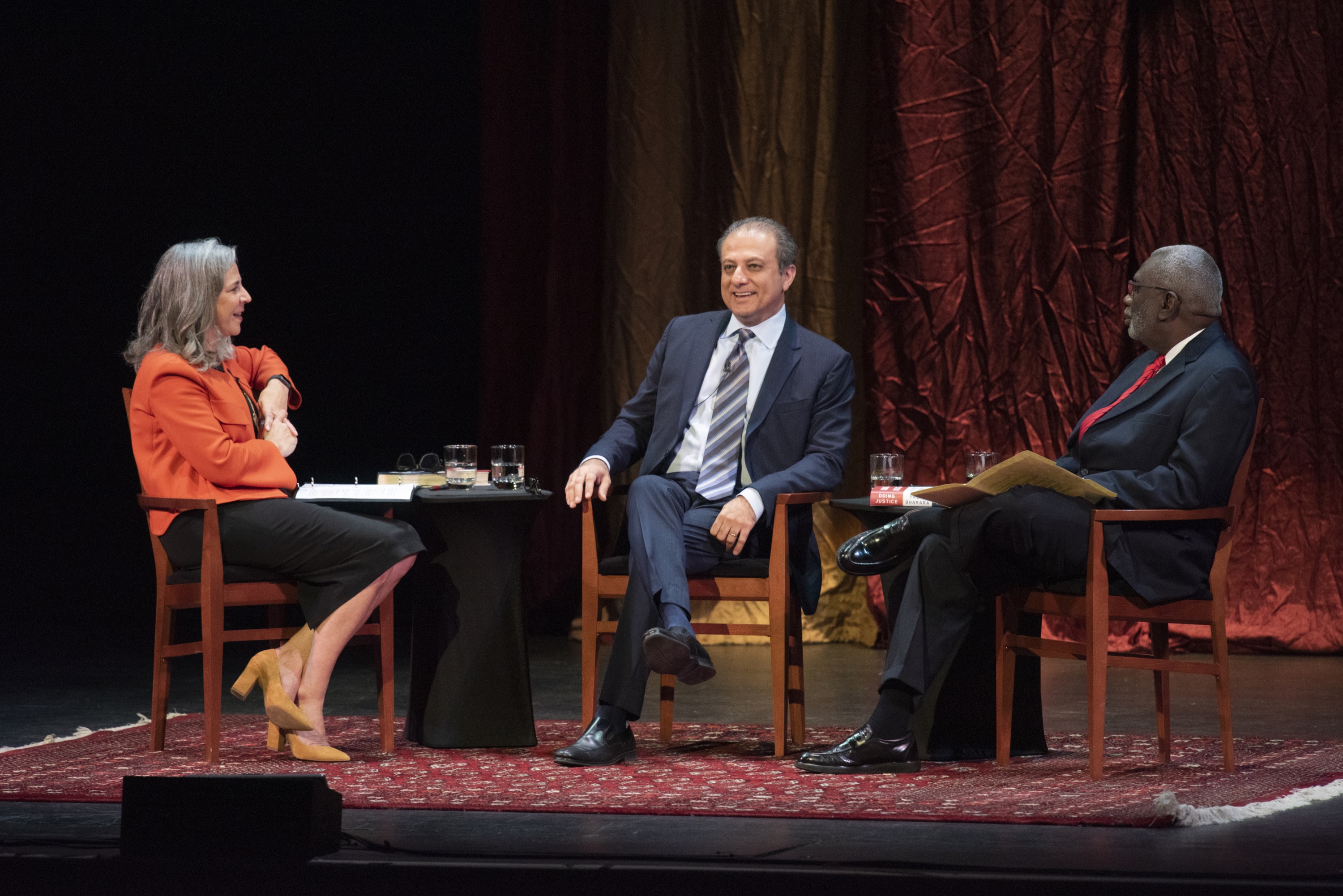Preet Bharara served as the top federal prosecutor in Manhattan from 2009-2017, and during his visit to North Carolina to deliver Elon Law’s 2019-20 Distinguished Leadership Lecture, he underscored the need to hold people in power accountable for their crimes, which leads to a stronger democracy.
Throughout his career as a U.S. Attorney for the Southern District of New York, Preet Bharara received more praise and gratitude when he successfully prosecuted one particular type of crime above all others: Public corruption.
And this was a top federal prosecutor who sent away to prison people who did many bad things: fraud, drug trafficking, terrorism, murder.
So why would Bharara be flooded with mail and emails and have strangers shake his hand on the streets of Manhattan after a jury would convict politicians and public officials for bribery?
“There’s something about public corruption that sticks in people’s craw like nothing else,” Bharara told hundreds of people Thursday night in downtown Greensboro. “You voted these guys into office – and it’s almost always guys – and they lined their pockets by virtue of the faith you placed in them, and they did it over and over and over again. That makes people upset.
“That’s not only an assault on a particular federal statute, it’s an assault on democracy.”

Public corruption – why it happens, why it shouldn’t be tolerated, and what should be done about it – served as the backdrop to a wide-ranging conversation at the Carolina Theatre when he visited North Carolina for the law school’s 2019-20 Distinguished Leadership Lecture presented by The Joseph M. Bryan Foundation.
The lecture was also the latest program scheduled as part of the 2019-20 Elon University Speaker Series. With a theme of “Quest for Truth,” this year’s Elon Speaker Series – supported in part by the News & Observer, the Charlotte Observer, and the Herald-Sun in Durham – is designed to promote the values of freedom of expression, honesty and accuracy.
Nearly 500 people filled the downtown Greensboro venue for the evening program that included a signing for anyone who purchased or brought their own copy of Bharara’s New York Times bestselling book, “Doing Justice: A Prosecutor’s Thoughts on Crime, Punishment, and the Rule of Law.”
Co-moderated by Elon Law Dean Emeritus George Johnson and Professor Catherine Dunham, the conversation ranged from a discussion about the role of a U.S. Attorney to the importance of developing friendships that span political beliefs.
Bharara took time to explain why he doesn’t seek the opportunity to serve on the bench and how it can be tough to decide whether to take a case to trial. Justice is not a science, he said. Prosecution is not a science. Judging is not a science and “you don’t just plug in numbers and have algorithms” to make the call.
Then there is the power a judge has to shape the course of someone’s life. The different between 70 months in prison and 78 months in prison could mean the difference in whether a person can visit with a terminally ill parent one final time or watch a child graduate school, among other important moments.
“I’ve never aspired to be a judge, even though it’s a nice job, it’s a prestigious job, and I think I would be OK at it,” he said. “The hardest thing a judge does is determine in criminal cases how many days, weeks, months, years you separate someone from liberty. That comes as close to a God-like role as you can have in life. I’m not into that.”
And the qualities of good leadership?
“The most important thing for any leader is judgment and integrity,” he said. Other important traits: curiosity, understanding how to motivate people, understanding morale, knowing when to delegate tasks, and inspiring those around you.
Nominated to the position by President Barack Obama, Bharara served as U.S. Attorney for the Southern District of New York from 2009 to 2017, earning a reputation as one of “the nation’s most aggressive and outspoken prosecutors.”

As U.S. Attorney, Bharara oversaw the investigation and litigation of all criminal and civil cases brought on behalf of the United States in the Southern District of New York. He supervised an office of more than 200 Assistant U.S. Attorneys, who handled a high volume of cases involving terrorism, narcotics and arms trafficking, financial and healthcare fraud, cybercrime, public corruption, gang violence, organized crime, and civil rights violations.
Under Bharara’s supervision, the office also brought a series of significant and systemically revelatory public corruption cases against members of city and state governments, including the former majority leader of the New York State Senate and the former speaker of the New York State Assembly – one a Republican, the other a Democrat.
Prior to his political appointment, Bharara served as an Assistant U.S. Attorney in the Southern District of New York and as a litigation associate at two law firms in New York. He graduated magna cum laude from Harvard College with an A.B. in Government in 1990, and from Columbia Law School with a J.D. in 1993, where he was a member of the Columbia Law Review.
Bharara joked about the end of his tenure as U.S. Attorney, pointing out to his Greensboro audience that he had been banned on Twitter by Russian President Vladimir Putin and fired from his job by President Donald Trump. But there was no laughing when he later argued that all public corruption should be investigated and prosecuted regardless of party or ideology.
“The signal it sends, both to people about support of democracy and the rule of law and equality before the law, is unparalleled,” he said. “The basic American premise is that no one is supposed to be above the law. The idea that a very powerful person decides they are above the law and can take bribes and can do terrible things and who can stop them because they’re big and powerful, that’s anathema to every ordinary American.”
The likelihood that Trump will be impeached by the U.S. House of Representatives? One hundred percent, Bharara predicts.
“I feel a little bit like the dam has broken and lots of people are coming forward (from the administration) because they see this is a crisis moment in American history,” Bharara said. “We’ll see.”



